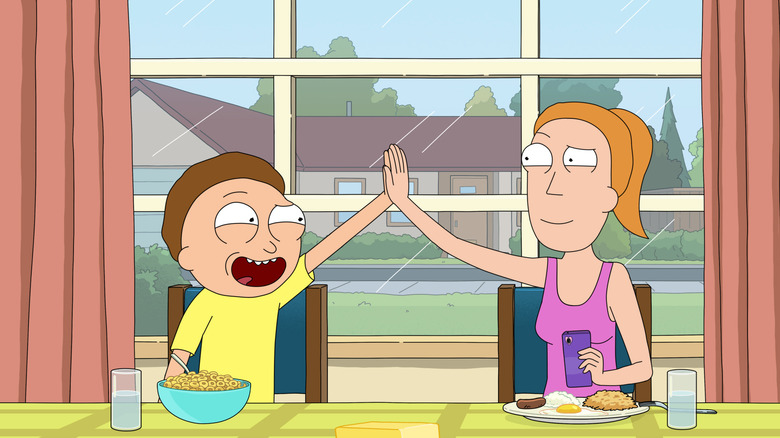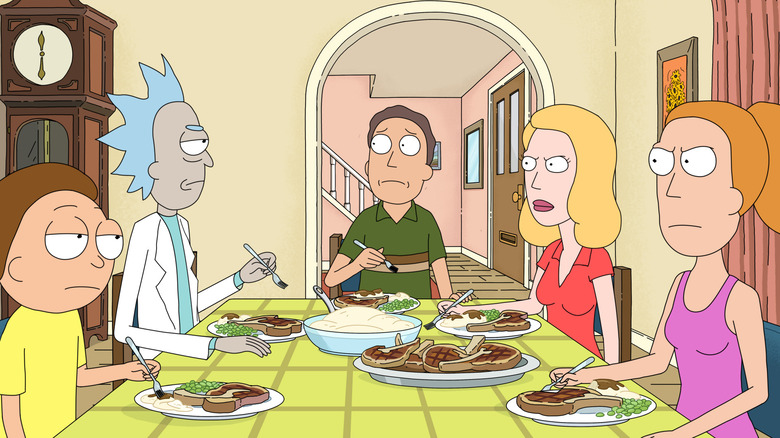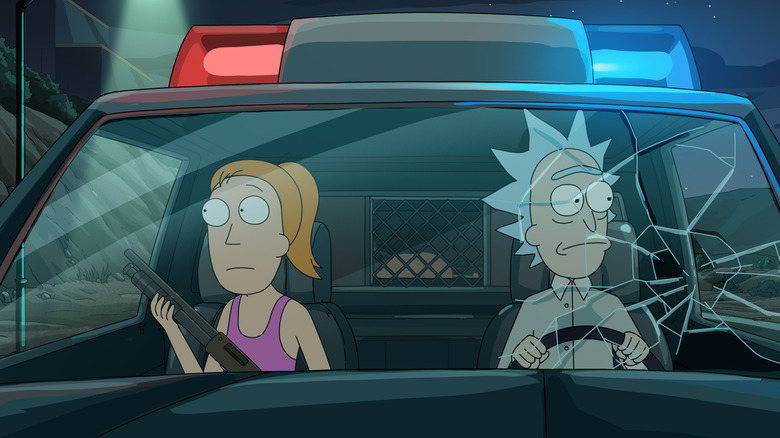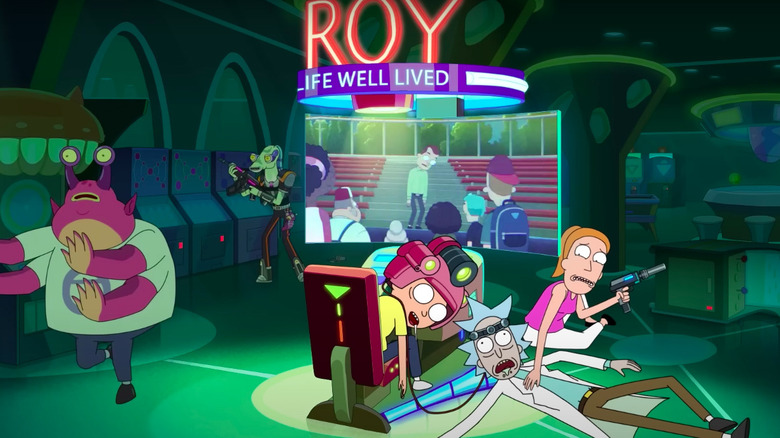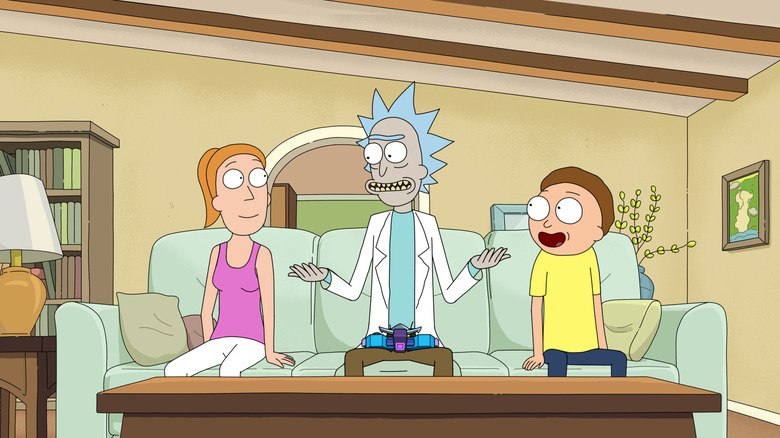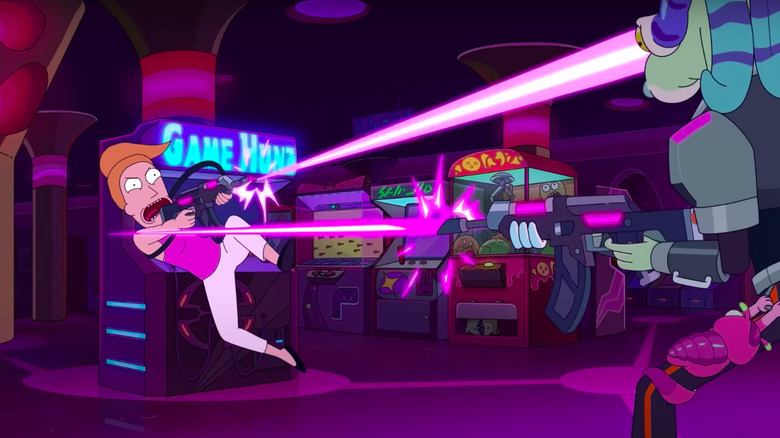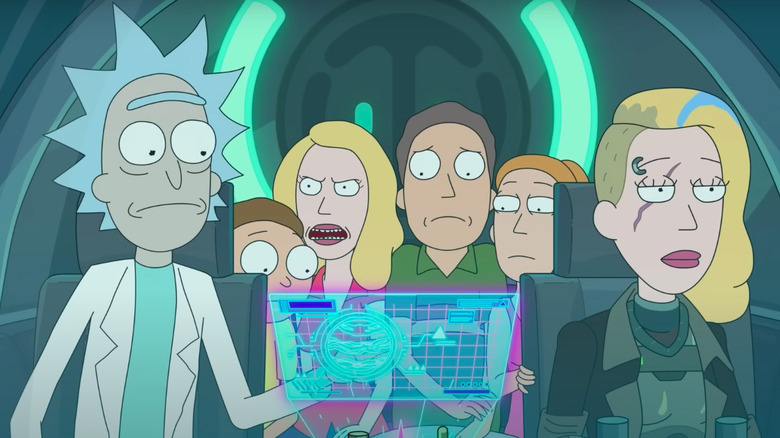Rick And Morty's Justin Roiland And Spencer Grammer Talk Multiverse Mayhem, Mythology, And Meta Mockery [Interview]
"Rick and Morty" is coming on up its 10th anniversary, even though the show is only premiering its sixth season in September. Thankfully, the hang-ups that delayed its production were done away with when Adult Swim renewed the series for a whopping 70 episodes back in 2018. They've still got 40 episodes left in that contract, which means there's plenty more "Rick and Morty" to come. But does co-creator Justin Roiland see that as the potential conclusion for the series? Don't count on it.
With the multiverse getting crazier and crazier in "Rick and Morty," it feels like the show could go on forever. Leading up to the sixth season premiere on September 4, we spoke with Justin Roiland and his co-star Spencer Grammer (the voice of Summer) about the endurance of the show, the multiverse mayhem, and the rich mythology that not only informs the show's narrative but also the comedy.
This interview was conducted in a virtual roundtable with two other outlets, and it has been lightly edited for clarity.
'This show could really go for a really, really long time'
After this sixth season, you'll have 40 episodes left in that 70-episode renewal contract that came about in 2018. Are you starting to think about an endgame for "Rick and Morty" that will arrive at the end of those remaining episodes? Or are you hoping to keep the show going after that?
Roiland: We'll see. I mean, we're definitely working. That's the nice thing about an order like that is that you can plan some stuff here and there. I guess we'll just see. It'll become a conversation down the road, with Discovery Network, apparently. [laughs] We'll be talking with the Discovery people after season 10. But I would imagine those talks will probably start during production of season 10, or maybe even season 9, just because they take so damn long to figure that stuff out. But yeah, I've always seen this show as a show that has legs. This show could really go for a really, really long time. And as long as we've got folks that are passionate about it and a fan base that wants to see more of this family and this crazy sci-fi multiverse that we've set up, I think we could do this for a long time.
'I think the multiverse stuff really has given us a huge component of the show that has been really fun and fresh'
Looking at these first episodes of season 6, you seem to be in a place where a show, after enough time, can have its own mythology be big enough where the show almost becomes about itself — its own closed circuit rather than having to reference outside. Can you talk about the evolution of where you feel your characters are by this point in the series, how deep you are into the mythology of the show, and how that might shape the show from this point onward?
Roiland: Well, historically, we've tried to have our cake and eat it too, in regards to the consequences and the canonical aspects of the show, in so much as we want to be able to do episodic episodes that somebody could just run into. You could show a friend [an episode] from season 6, 7, 8 that you don't need to see anything else and you can appreciate it in a bubble, right? But then we also want to be able to have this crazy canonical history with the show and arc and future. I think the multiverse stuff really has given us a huge component of the show that has been really fun and fresh. As sci-fi fans and fans of that concept in general, it's really, really fascinating and interesting to lean into that as our safety net, for being able to balance those two things, the crazy heavy canonical stuff and character stuff and those changes within those characters.
But then also be able to still tell an episode that's a very "Rick and Morty" classical sci-fi fun romp that you could just show somebody that's just self-contained madness. I feel like we're at a point in the show where we could do whatever we want in terms of that stuff. We're able to do both, still. Up until a point where we really feel like, "Okay, the episodic stuff is holding us back," up until we feel that way as creators, I don't see any reason to get rid of it or dismiss it. [For example,] the character of Summer has grown and changed so much over the seasons, but we can still tell an episodic story without —
Grammer: Without having to amplify how much she's changed from season 1 to season 6.
Roiland: Yeah, and it's fine. People can see an episode with Summer, as she currently is as a character, and not feel like they're missing anything about the overall arcs and canonical craziness of the show. So that kind of stuff, personality-wise and relationship-wise, that all feels okay to me, to be able to grow characters in that way. Or to have someone who's really f***ing lost their s**t because of some insane, cataclysmic — you have a character who's really just f***ed up. Potentially, even that would be okay as a point of entry, but you would have people going, "Why is that character so f***ed up?" "Well ,they weren't always that way. Go back and start at the beginning and you'll see."
But I do love that stuff. The end of season 5, we're poking fun at it, where we have the Rick that is a Stan Lee Rick popping up with the reference to what is going on. That's us acknowledging, "Yeah, we have canon and yeah, we have deep lore that we want to go back and explore." But we want to service the show in that way because that's stuff we would love to see. I'm a fan of that stuff, I love that stuff. But we also are making fun of that as well, because it's for the people that are really into the show. If you're just some casual viewer and you watch that episode, you're like, "What in the f*** is going on? What is this show?" And that's why it's funny to have that little Stan Lee moment. But anyway, I think I'm way off now with your question, but that was a good question, though.
'The jokes always need to feel like well-crafted jokes and not just references'
Just as a quick follow up to that, does the mythology change anything for you on the comedic level, where you have so many of your own older jokes in the canon to call back to and work with?
Roiland: I feel like the smartest angle is to always try to just stay true to what you think is funny. Look, we don't ever want to be like, "Bazinga!" We never want to do that s**t. The jokes always need to feel like well-crafted jokes and not just references, because that's going to turn people off. But there are the occasional references now, because it is kind of insane. We'll have an acknowledgement of Rick turned himself into a pickle, is he going to turn himself into a f***in', ya know, just little things here and there that we've done. But by and large, we stay away from that stuff. I think we just write the show the way we always have. Make the comedy the way it always has been, just really well-crafted and funny jokes and dialogue. There's a lot of thought that goes into that stuff, all the way up until the show airs, it feels like.
Justin, Spencer, this is for both of you: The show continues to be one of the most successful animated comedies around. There also is an unprecedented amount of animation right now, as far as animated episodic comedies. Some of these shows start off pretty good and then they go off the rails. Just because you have a good premise and some interesting characters is no guarantee that you'll continue to sustain that. What do you guys think continues to make this show so appealing? Is there some secret sauce? What do you think separates it from so many other shows? There's a lot of other good animation out there, but this show is a perennial favorite and really continues to grow. Can you point to anything from your perspectives?
Roiland [to Grammer]: Do you want to say anything?
Grammer: Well, yeah, I think you guys did a really great job in casting us.
Roiland: Yeah. I was going to say, that's a big one.
Grammer: I'm not saying casting choice, obviously. But I think not every actor is great at voice acting. I think that there are some people who translate better than other people by their voice, and I think you picked some really unique characters. Obviously, [Chris] Parnell's had a pretty huge, prolific animation career already, and this was the beginning of mine, and I'm so grateful for it. Sarah [Chalke] is a hilarious comedian as well. You picked really great comedic actors. And we all live in this universe, I think, well. There's a verisimilitude and homogenization. That's not even a real word. Just going with it. But I also think — because I watch a lot of animation and I feel similarly: They start off with really interesting premises, and sometimes they get lost in the shuffle.
I think that the writing is exceptional, too. I think that the structure of the writing is great. I think it always ties around the family, and there's a heart to the show that doesn't necessarily exist. You can be irreverent and satirical, but if you can root it in a family where we care about people and they're multidimensional, it really allows us to enjoy and grow and feel a humanist experience with the show itself.
That's been my observation on it and I think that's what really has made it stand out or stand this test of time. I think "The Simpsons" does a similar thing in that. But obviously, I think "Rick and Morty" is doing a great job in other ways.
Roiland: I mean, listen, we're only on 6 —
Grammer: That's true, yeah.
Roiland: And they're on, what? Season 20 or 30 now?
Grammer: No, no, they're on 33. They're on season 33, okay?
Roiland: Yeah, good lord.
'I never would've imagined the show reaching the heights that it's reached when we started'
Roiland: I also just think that it's a high bar of quality, internally. Dan [Harmon], me, and we have [executive producer] Scott Marder now, who's just incredible. We all care and we believe in the show, we believe in the characters and we write up to the characters. That's always been a thing. And that's not to say that other shows don't care, because I'm sure they do, but I think with this show, we've been very lucky in that we've been given from the network, historically, they are very respectful of us in making sure that what we're doing is as good as it should be. Look, not every episode is incredible. We've got some in the historical canon or in the pile that are not our favorites. But for the most part —
Grammer: Yeah, but they've got something in them. Even the ones that aren't the favorites, they still have some stuff in it that's really interesting.
Roiland: Yeah, there's always something really cool in every episode, absolutely. And there's funny moments in every episode. But I would say, for the most part, we've been really good in terms of making sure that we're telling stuff that's really exciting to us, and then we just care. It's just giving a s**t.
Getting back to Spencer with the actors, it's like yeah, we really rolled 20s on the cast. I have a blast doing Rick and Morty's voices, and I still will do them back and forth to each other and improv and come up with things. And that's a special little piece of the show. There's not as much of it now as there was in the first two seasons, but it's still there occasionally. That's a thing that I think drew people in, because that was always a favorite for me, and I don't know how many other shows do it.
I always thought it was so weird, the idea of just improvising something and then having all these talented people spend all this time animating and slaving over something that you just spit out in 30 seconds. Usually, it's like, "No, it's very well-crafted, written dialogue that took the writer's sweat and blood, and now we're going to hand it over to you guys, and you're going to sweat and f***ing draw it and animate it." But no, it's just like, "What if I just said this?" Just the thought of that seemed insane as someone who watches animation. Obviously, the "South Park" guys do their whole thing, where they just knock out an episode in eight days, and everybody crunches and grinds together, which is an incredible thing. But I always just love that idea.
Even in the video game space, it's like I'm doing the same thing with my video games where it's unheard of. All the time and love and work that goes into crafting these worlds and all of the different versions of what could happen, and you're just going in there and just making up the dialogue and just improv-ing? That's not allowed, you can't do that. But it makes the game feel really weird and different in a way that video games don't feel, at least [in a way] I haven't seen as a big gamer. And I think that was the approach back in the day with "Rick and Morty," and we still do it from time to time. You get that energy.
So it's just a lot of things, to answer your question. It's a perfect storm of all of these things, because we've got Dan Harmon, who's a brilliant, just super talented dialogue writer and storyteller. And then we've got me. I'm crazy and I've got all these weird big ideas. And Spencer's f***ing crazy, too. I don't know.
Grammer: So crazy.
Roiland: And then we have this amazing cast. Just the look of the show, I think, is really appealing, too. To be honest with you, I never would've imagined the show reaching the heights that it's reached when we started. I just thought we'd be making a cool Adult Swim show, and yeah, we'd have a fan base and stuff, but I never thought it would get like this. It's surreal.
Grammer: I agree.
'We have a very high bar of quality of what we perceive as being good, as fans of sci-fi and all this stuff out there'
Obviously, the show does plenty of pop culture riffs. It has since the beginning. But then you also take it to another level by being meta about the riffs themselves, almost mocking yourself from time to time. For example, in the season 6 premiere, Morty calls out Rick for an Iron Man reference, and he asks, "Who was that for?" That feels like you're almost taking yourselves to task for those kinds of jokes.
Roiland: Yeah.
Is that something where you just have to get it out of your system and criticize yourself while also letting yourselves get away with the joke?
Roiland: Yeah, that's just an instinct that I think we have. Harmon and I are very similar, comedic instinct-wise, and that's definitely a thing, because as much as I try to keep it out of my head, there is a little voice in your head that is the audience, because we are the audience as well. You can't resist that stuff sometimes, because it's just too good. Sometimes, you get ahead of the audience. Especially for me, if I'm doing something and I feel like, as a viewer, I would be ahead of this, then I'm going to make a comment about it. There's something about that, I don't want to say it lets you off the hook, [but it does] for a little bit though, right? The Iron Man reference is a great example, where it's like, you're off the hook a little bit for that joke. But also, I think what it does is it reinforces the viewer who's thinking the thing that they're about to hear you say. They're thinking a thing and then all of a sudden, the character says the thing and they're like, "Holy s**t. Okay. Well, all right, that's pretty f***ing cool." You know what I mean? That's at least how I experience a lot of content. If I'm thinking a thing and then —
Grammer: They do it.
Roiland: But they make the joke even funnier, not just by acknowledging it, but adding another punchline and also some acknowledgement of the thing I just thought. That always is a cool moment for me as an audience member. And I'm not saying we think about it [all the time.] Like you said, it's like, "Oh, man, we've got to do this joke, but we can't do this joke. Oh well. Okay, well, maybe we can if we comment about how stupid it was," or whatever.
I think there's just a high bar — and I guess that gets back to the other question, too. We have a very high bar of quality of what we perceive as being good, as fans of sci-fi and all this stuff out there. So when we're writing this show, that bar of quality is something that just follows us like a curse and maybe a blessing as well. You know what I mean? It's both. It's like, if you want something to be good, it's not easy. So yeah, that's the curse side of it. But then we want our s**t to be good.
'I want to see Marvel just go full-blown hardcore multiverse'
On that same train of thought, it feels like you break your brains a little bit with the science aspect of the show. I've talked to some of the other writers about just keeping timelines and the multiverse and all that straight. How do you guys feel when you see big budget franchises like Marvel and DC putting on their multiverse game? Do you sit back with a cigarette like, "Oh, child..."
Roiland: No, no, no. I'm the opposite. Personally, I actually am f***ing stoked. I'm like, "Let's go. F***ing pedal to the metal, let's do it." I want to see them do it. I want to see more. I'm obsessed with that s**t. Obviously, just look at our show. I think it's such a fascinating thing if done well. Now yes, if you're going to get really logical about it, they've got inconsistencies and there are things in the Marvel multiverse canon that are in incongruent with each other. But I just turn that part of my brain off and just enjoy. As long as they're doing it and they're going to go there and really commit to multiverse s**t, I'm so there for it. Spider-Man, the most recent one, that was f***ing amazing. I know, canonically, it doesn't quite — don't even get me started.
In "Endgame," there's some issues where Steve Rogers is just suddenly in that same universe but old. So wait a minute, did that mean he went back in time for real in that same exact timeline, because I thought they were crossing into other realities, right? How does that make sense? You know what I mean? Wait, now we're getting into "Back to the Future" territory. But I just go, "Okay, well, you know what? Maybe he somehow figured out a way to get back to that reality as an old dude and who cares?" And I just flip that switch and just enjoy the f***ing thing. It's really well-crafted. And for f***'s sake, it's some of the best cinematic s**t in terms of just the crazy crisscross. It's just amazing. So I think it's all really cool, I'd want to see more of it, and I'm excited that it's happening.
Honestly, if you think about it, we didn't create the s**t. Marvel was doing it and DC was doing it back in the comic books way before us. We weren't super comic nerds, so we didn't really know about all the crazy s**t, but I was thinking about "Sliders" in the deepest corner of my mind, not even really remembering that I was referencing it.
Grammer: "Quantum Leap."
Roiland: Yeah, just all kinds of crazy —
Grammer: A little "X-Files," a little sci-fi s**t.
Roiland: Just crazy s**t that we grew up with. And it's like not actively realizing it, but later, retroactively, after a few seasons, I'm re-watching "Sliders" and I'm like, "Oh, my f***ing God, dude." Even just the first episode blew my f***ing mind. And that was something that I watched after season 3 and we did some of the s**t we did in season 3. I was like, "Dude, I remember watching this in high school," and I had not seen it since high school. So it was in there somewhere.
Anyway, multiverse stuff is just f***ing endlessly fascinating to me, and I want to see Marvel just go full-blown hardcore multiverse. And let's see what DC does. The one thing I will say, one of the strengths with DC is that the movies don't have to affect each other tonally. So you can have a "Joker," but then you can have a "Shazam!" and it's all good. But if they're going to be tying them together, how do you do that with a [Christopher] Nolan Batman and a f***ing "Shazam!" tonally? I don't know, how do you do that? They're so different. Even what James Gunn did with "The Suicide Squad," which is f***ing amazing. That movie is absolutely just beautiful. It's incredible. It's one of my favorite superhero things that has been made recently. It's so good. But how do you take that and combine that with what they're doing with, let's say, the new Batman? How do you mix those worlds in a multiverse way? I guess multiverse is different than cinematic universe. So sorry.
But yeah, the Marvel multiverse stuff, bring it, man. I want to see all the actors coming back. What they did for the Spider-Man thing was just the f***ing coolest ever. It was like, "Okay, so it's all real. It's all canon. Everything is canon." I guess that's the big cheat code, right, when you have multiverses, and that's something that we've leaned into on this show. Look at the Cronenberg version of Jerry. It's like he's just a different person. He's not the same at all. It's fun that we got to do that and still go back to what the show is, the standard show. But that's still a thing we've got to do, and the multiverse is the safety net underneath those.
Grammer: The cheat code. I love that you call it a cheat code. That's the best way to put it.
Roiland: It's the best, because not only is it a cheat code, but it's also this cool, sci-fi, awesome thing that might even be f***ing real. We don't even know.
Grammer: It might be real, right. Yeah.
Roiland: It could very well be. We literally don't know. With quantum physics and just all the crazy s**t, we don't know what the f*** is going on. Who knows, man? We might find out that by doing some weird thing. You actually can transition into another reality, and then people are a little different around you, and you're like, "What the f*** just happened?" Then there's the Mandela effect. You're like, "Well, wait a minute. No, that wasn't that way. That was a different way." We don't know what's going on. Right? There's a lot of weird s**t.
The sixth season of "Rick and Morty" premieres at 11:00pm ET/PT on September 4, 2022 on Cartoon Network's Adult Swim.
